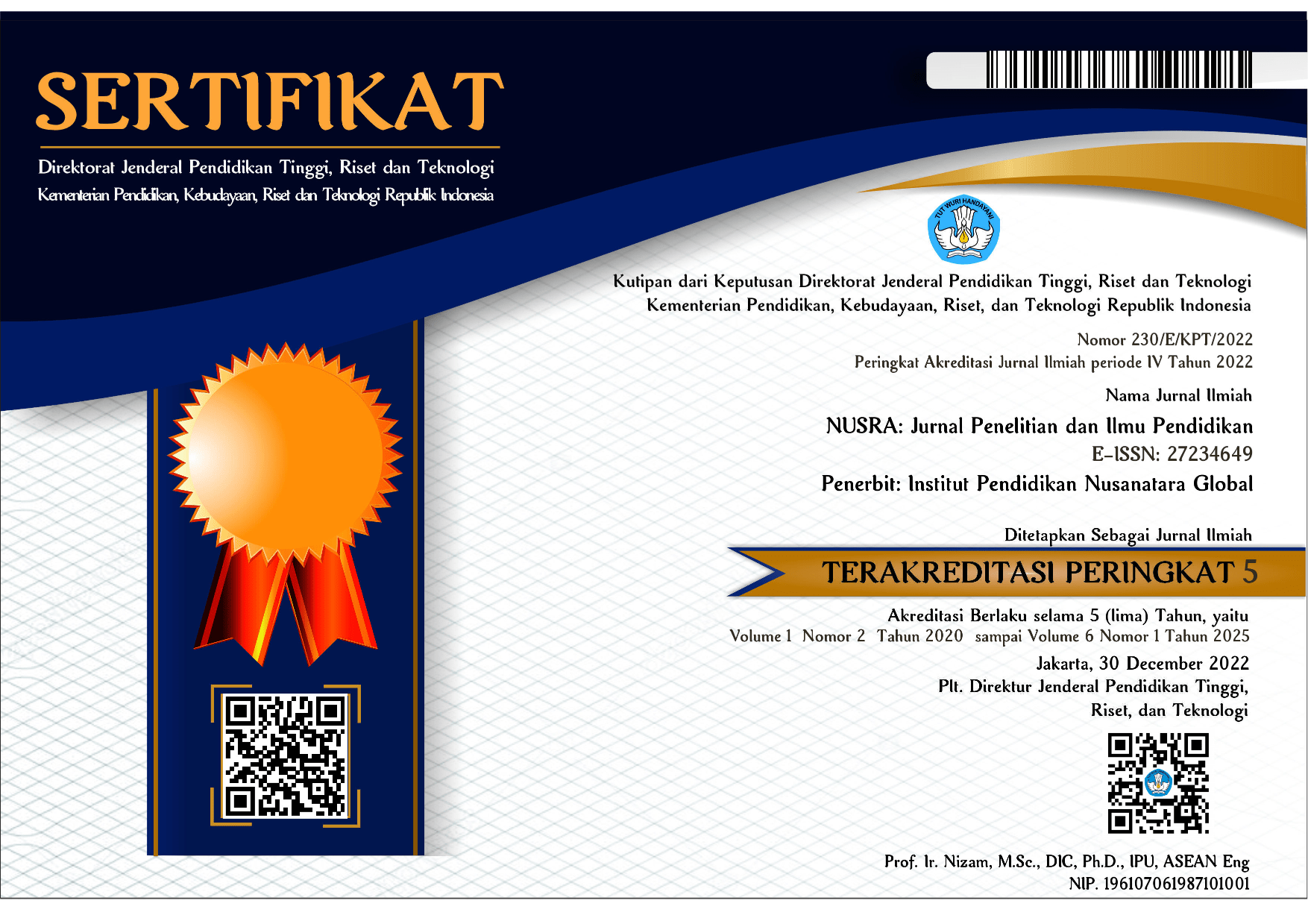Peran Nilai, Sikap, dan Kepuasan Kerja dalam Konteks Organisasi
DOI:
https://doi.org/10.55681/nusra.v5i1.1866Keywords:
Role of Values, Role of Attitudes, Job SatisfactionAbstract
This research aims to determine the role of Values, Attitudes and Job Satisfaction in organizations. This research is a literature study with a descriptive analysis approach. Meanwhile, the data source used is all literature regarding the role of values, attitudes and job satisfaction in the organizational context. The data is then collected and processed into research results. Data validity is carried out by source triangulation, namely comparing data obtained from various sources. This research shows that the role of values, attitudes and job satisfaction is proven to have a significant dominant influence. The results of this research indicate an increase in satisfaction among organizational members, which can be achieved by encouraging strong work motivation and strengthening commitment to the organization based on organizational cultural values. This effort can be started by creating a conducive work environment; The organization is able to provide all facilities that support the smooth running of learning and teaching. To improve the quality of human resources, apart from effective management, high discipline is required from all members of the organization.
Downloads
References
Badrianto, Y., & Astuti, D. (2023). Peran Kepuasan kerja sebagai Mediasi pada Pengaruh Komitmen Organisasi terhadap Kinerja Karyawan. Jesya, 6(1), 841–848. https://doi.org/10.36778/jesya.v6i1.1013
Darmawan, D. (2016). Peranan Motivasi Kerja, Komitmen Organisasi dan Budaya Organisasi Terhadap Kepuasan Kerja. Jurnal Ilmiah Manajemen Pendidikan Indonesia, 2(3), 97–106. https://doi.org/10.31227/osf.io/e32dz
Hermawan, A. A. D., & Suwandana, I. G. M. (2019). Peran Kepuasan Kerja Memediasi Komunikasi Terhadap Kinerja Karyawan. E-Jurnal Manajemen Universitas Udayana, 8(7), 4474. https://doi.org/10.24843/ejmunud.2019.v08.i07.p17
Latief, A., Nurlina, N., Medagri, E., & Suharyanto, A. (2019). Pengaruh Manajemen Pengetahuan, Keterampilan dan Sikap terhadap Kinerja Karyawan. Jupiis: Jurnal Pendidikan Ilmu-Ilmu Sosial, 11(2), 173. https://doi.org/10.24114/jupiis.v11i2.12608
Luthans, F. (2011). Organizational Behavior: An Evidence–Based approach. In Organizational Behavior: An edivence-Based Approach. In pearson education,Limited (Vol. 10, Issue Chapter 4).
Parozak, M. R. G., & Rosita F. (2020). Tingkat Kepuasan Pelanggan Siswa Kelas Viii Smp N 4 Selong Terhadap Pelayanan Administrasi Sekolah Pada Masa Pandemi Tahun Ajaran 2020-2021. Nusra: Jurnal Penelitian dan Ilmu Pendidikan, 1(2). https://doi.org/10.55681/nusra.v1i2.138
Prasetyo, I., Ali, H., & Ende Rekarti. (2023). Peran Gaya Kepemimpinan Dan Budaya Organisasi Dalam Meningkatkan Komitmen Organisasi. Junral Ilmu Manajemen Terapan, 4(5), 657–664.
Rahmat, W. M., & Kurniawati, K. (2022). The Influence of Brand Experience on Brand Loyalty through Perceived Quality, Brand Trust and Customer Satisfaction as Mediation. SEIKO : Journal of Management & Business, 4(3), 215. https://doi.org/10.37531/sejaman.v4i3.2550
Silaen, N. R., Syamsuriansyah, S., Chairunnisah, R., Sari, M. R., Mahriani, E., Tanjung, R., Triwardhani, D., Haerany, A., Masyruroh, A., & Satriawan, D. G. (2021). Kinerja Karyawan.
Downloads
Published
How to Cite
Issue
Section
License
Copyright (c) 2024 Fauzi Sholeh Yasin, Ahmad Muhaimin, Yayat Suharyat

This work is licensed under a Creative Commons Attribution-ShareAlike 4.0 International License.














